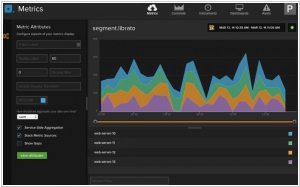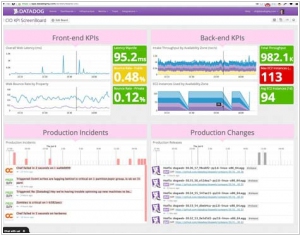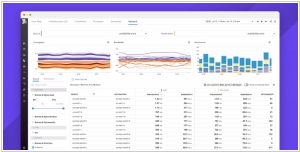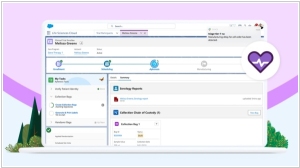Datadog vs Librato
June 03, 2023 | Author: Michael Stromann
2

One platform, unlimited metrics. Monitoring Zen. We get your data flowing to us from anywhere, whether it's through our API, a turn-key solution, or one of our many open source collection agents. Turn your raw data into intuitive metrics with our powerful composite metric defi-nitions. Owned by SolarWinds.
Datadog and Librato are both popular monitoring and observability platforms, but they have distinct differences:
1. Feature Set: Datadog offers a comprehensive set of monitoring and observability features, including metrics, logs, traces, APM, synthetic monitoring, and more. It provides a unified platform for monitoring various aspects of infrastructure, applications, and user experience. Librato, on the other hand, focuses primarily on time-series metrics monitoring and visualization. It excels in collecting and visualizing metrics data, but may have limited capabilities in other areas like log management or APM.
2. Scalability and Performance: Both Datadog and Librato are designed to handle large-scale monitoring needs. However, Datadog has a reputation for its scalability and performance capabilities, capable of handling massive volumes of metrics data in real-time. It is known for its robust architecture and ability to handle high-frequency metrics collection and analysis. Librato is also designed for scalability, but it may have limitations in terms of processing large volumes of metrics data in real-time.
3. Integrations: Datadog has an extensive ecosystem of integrations, supporting a wide range of technologies and platforms. It integrates seamlessly with popular tools, services, and cloud providers, enabling comprehensive monitoring across the entire technology stack. Librato also offers integrations with various systems, but its ecosystem may not be as extensive as Datadog's. Organizations should consider their specific technology stack and ensure that the desired integrations are available in the chosen platform.
4. User Interface and Experience: Datadog provides a user-friendly and intuitive interface, with customizable dashboards and visualizations that enable easy monitoring and analysis. It offers a rich set of features for data exploration, alerting, and collaboration. Librato also provides a user-friendly interface, focusing on the visualization of metrics data. However, the interface may have a simpler design compared to Datadog, which may be preferable for users who prioritize simplicity and ease of use.
5. Pricing: The pricing models of Datadog and Librato differ. Datadog typically offers pricing based on the volume of metrics, logs, and other data ingested. It provides various plans with different features and usage levels. Librato, on the other hand, offers pricing based on the number of metrics and their resolution. Organizations should evaluate their monitoring needs, data volume, and pricing structure to determine which platform aligns better with their budget and requirements
See also: Top 10 IT Monitoring software
1. Feature Set: Datadog offers a comprehensive set of monitoring and observability features, including metrics, logs, traces, APM, synthetic monitoring, and more. It provides a unified platform for monitoring various aspects of infrastructure, applications, and user experience. Librato, on the other hand, focuses primarily on time-series metrics monitoring and visualization. It excels in collecting and visualizing metrics data, but may have limited capabilities in other areas like log management or APM.
2. Scalability and Performance: Both Datadog and Librato are designed to handle large-scale monitoring needs. However, Datadog has a reputation for its scalability and performance capabilities, capable of handling massive volumes of metrics data in real-time. It is known for its robust architecture and ability to handle high-frequency metrics collection and analysis. Librato is also designed for scalability, but it may have limitations in terms of processing large volumes of metrics data in real-time.
3. Integrations: Datadog has an extensive ecosystem of integrations, supporting a wide range of technologies and platforms. It integrates seamlessly with popular tools, services, and cloud providers, enabling comprehensive monitoring across the entire technology stack. Librato also offers integrations with various systems, but its ecosystem may not be as extensive as Datadog's. Organizations should consider their specific technology stack and ensure that the desired integrations are available in the chosen platform.
4. User Interface and Experience: Datadog provides a user-friendly and intuitive interface, with customizable dashboards and visualizations that enable easy monitoring and analysis. It offers a rich set of features for data exploration, alerting, and collaboration. Librato also provides a user-friendly interface, focusing on the visualization of metrics data. However, the interface may have a simpler design compared to Datadog, which may be preferable for users who prioritize simplicity and ease of use.
5. Pricing: The pricing models of Datadog and Librato differ. Datadog typically offers pricing based on the volume of metrics, logs, and other data ingested. It provides various plans with different features and usage levels. Librato, on the other hand, offers pricing based on the number of metrics and their resolution. Organizations should evaluate their monitoring needs, data volume, and pricing structure to determine which platform aligns better with their budget and requirements
See also: Top 10 IT Monitoring software
Datadog vs Librato in our news:
2015. Cloud monitoring service Datadog fetched $31M

Datadog, a platform that enables companies to monitor the performance of their diverse cloud deployments, has secured a new round of Series C funding amounting to $31 million. With notable customers such as Netflix, Spotify, EA, and Mercadolibre, the company has expanded its workforce from 25 employees last year to 75 employees presently. Moreover, Datadog has ambitious plans to double or even triple its headcount in the coming year. While facing competition from rivals like Boundary, Server Density, and Stackdriver (acquired by Google last year), Datadog continues to provide its unique value proposition.



